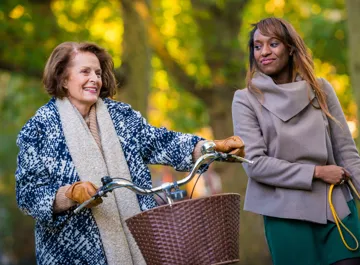
First Timers: Kickstarting a New Volunteer Revolution
Explores first-time volunteering and makes recommendations for ways to encourage more individuals to volunteer for the first time.
Take me thereVolunteering in social care has not received the same policy and practice focus as volunteering within the NHS. However, in this report we argue that volunteering has a critical and vital role to play in improving both the working and living environment for staff and residents.
Previous research literature has found benefits to staff in terms of morale and job satisfaction, while residents benefit in terms of increased wellbeing. Residents’ families also benefit in terms of greater satisfaction with the quality of care that their loved ones receive, and volunteers benefit in terms of skills development, confidence-building and employability.
This report presents two new pieces of research: one with a nationally representative sample of UK Adults (n=2000) and the second with care home staff (n=100). Both survey findings are insightful and highly encouraging with respect to the public appetite to volunteer and staff enthusiasm for volunteers.
6% stated they were currently volunteering in a care home, while 13% of those between the ages of 18–34 were currently volunteering versus 1% of those who are 55 years old and over.
38% stated they would consider volunteering, while 52% of those between the ages of 18–34 would consider volunteering versus 28% of those who are 55 years old and over.
12% stated they would volunteer because they are considering a career in care.
33% stated that they would volunteer because they have ‘talents and skills that could be of use’ 40% know ‘care home staff were under pressure and wanted to support them’.
Those currently volunteering or interested in volunteering are most interested in the following types of activities:
• 59% in providing social and emotional support to residents one to one,
• 47% in helping at mealtimes, and
• 42% in running group activities.
98% of staff currently working with volunteers state they ‘enjoy working with volunteers’.
90% of staff not currently working with volunteers would like to see more volunteers in care homes
94% of staff felt volunteers add ‘a lot of value’ for residents.
85% of staff felt volunteers add ‘a lot of value’ for staff.
Staff thought that the top three contributions made by volunteers are:
Staff were asked what would strengthen the impact of volunteering in care homes:
The pandemic – and, most recently, the cost-of-living crisis – has helped raise awareness around the issues facing the care sector. There is an urgent need for us to do things differently, to be bold and to put those working and living in care at the centre of a more humanistic model. Both Cottam (2021i) and Dixon (2021-22ii) call for a reimaging of social care that supports people to flourish rather than just exist.
We believe that greater civic participation – via volunteering – can support a new care model that puts the wellbeing of staff and residents at its centre. Based on the evidence, we set out four recommendations for improving the wellbeing of residents and staff in care homes:
The evidence tells us that there is public appetite to volunteer in care homes, with 6% already volunteering and 43% planning or considering volunteering. In addition, the survey data also found that 1 in 3 people are motivated to volunteer in a care home because they have ‘talents and skills’ which could be used.
The evidence tells us that care staff want to work with volunteers – of those staff currently working with volunteers, 98% stated that they ‘enjoy working with volunteers’ and 90% of staff not currently working with volunteers would like to see more volunteers in care. This demonstrates a clear desire to work with volunteers.
The evidence tells us that well-designed volunteer roles can have significant benefits for residents, their family and staff. For residents, the evidence highlights improved mood, cognitive function and perceived improvements in the quality of care, as well as greater family satisfaction with care; for staff, there is an increase in job satisfaction and reduced levels of work stress.
The evidence tells us that volunteering can be a gateway into a career/job in health and social care (PPP 2022iii). Well-designed volunteer programmes could also do more to support careers/jobs in social care. Those stepping forward to volunteer in health and care already have an interest in this area. We know from the literature review (see Hill, 2016iv) and the survey data that those stepping forward to volunteer in care homes tend to be younger.
Reimagining Social Care - The Role of Active Citizenship is the fourth in the Kickstarting a New Volunteer Revolution series of research-led reports by Royal Voluntary Service in which leading voluntary sector experts examine the future of volunteering. Previous reports have explored the barriers to volunteering among different groups, how volunteering can help counter health inequalities, and how it can improve social mobility.
The Reimagining Social Care - The Role of Active Citizenship was informed by a literature review undertaken by Dr Julie MacInnes, Centre for Health Services Studies (CHSS), University of Kent in July 2022.
Reimagining Social Care - The Role of Active Citizenship was supported by players of People’s Postcode Lottery.
Reimagining Social Care - The Role of Active Citizenship was launched at a webinar in December 2022.
Our research report series includes the following reports:

Explores first-time volunteering and makes recommendations for ways to encourage more individuals to volunteer for the first time.
Take me there
Examines the motivations, attitudes, benefits, routes and barriers to volunteering, and discusses the implications for civic life and society.
Take me there
Sets out how boosting civic participation can tackle health inequalities.
Take me thereWe're always happy to share our experiences and discuss new ways we could work together in partnership in the NHS and in the community.